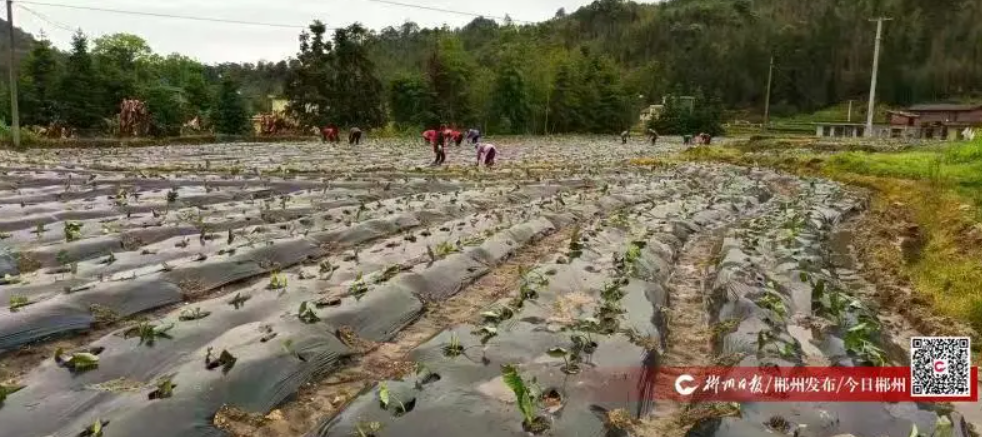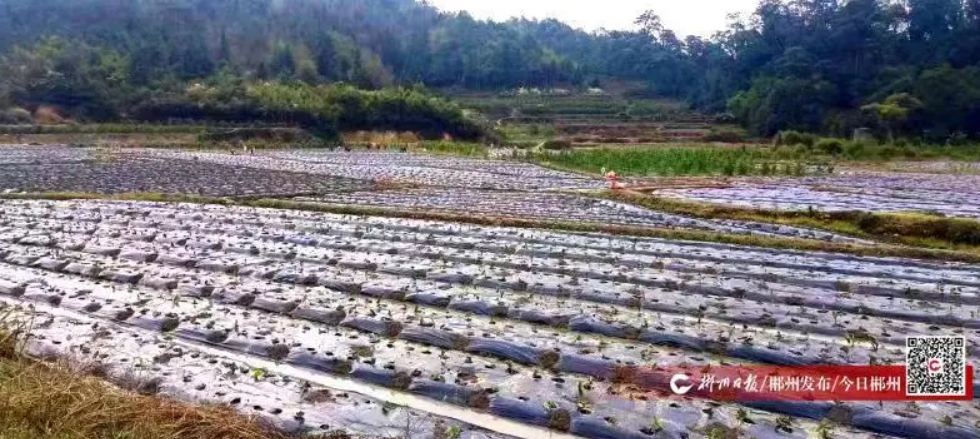Industries thriving in deep mountains
2023-04-20
Amid swirling spring rain and mountain mist, serenity veils the land of the Apoji villager group in Pingwan Village, Rucheng County, while the hilltop not far away is bustling with activities.
Four plows are thundering across the field, leaving behind strips of raised beds. Following closely, over 30 locals in raincoats and bamboo hats are busy with soil preparation and topdressing for tea seedling cultivation, a vibrant scene among silent mountains.
The 150-mu (10 hectares) tea plantation will be filled with Rucheng Baimao (white-hair) Tea, a famous premium variety that has been grown for over 50 years in Rucheng County, serving as a pillar industry with an output value exceeding 5,000 yuan per mu (about 0.07 hectares).
Situated on a hillside with an altitude of over 1,000 meters, the Apoji villager group boasts long periods of fog and selenium-rich sandy soil, making it ready for Rucheng Baimao Tea cultivation. It is not easy, however, to develop the tea industry in such a high, steep area with dense forests. For Apoji, it’s the first try.
Pingwan Village, a remote area where Hunan Province and Guangdong Province meet, is more than 30 kilometers from the town, at least an hour’s drive along the winding road. It includes 10 villager groups and 23 natural villages, with 2,049 residents in 483 households quite dispersed on its 57,000-mu (3,800 hectares) land.

Despite well-improved supplies of water, electricity, roads, and communications in its poverty alleviation efforts, especially roads available for all village groups, Pingwan Village still has weak industries and limited income sources due to its geography, location, and deep-rooted traditional farming culture.
Older villagers live only by farming traditional crops and bamboo forests, while younger ones flood outside for a job, a stark contrast to the situation across a river in Hongshan Town, known for tea products, of Renhua County, Guangdong Province.
“It makes no sense to not tap the precious resources that these lush mountains and lucid waters hold.” In the second half of 2022, Li Pingwen, an official of Rucheng County Agricultural and Rural Bureau, led a team to come over to the village to help, joining hands with the town’s resident cadres and the two village committees to make industrial development the priority of rural revitalization. Through regular investigations, meetings, and polls, they set Rucheng Baimao Tea as a breakthrough and entrepreneurs as a guiding role.
Pingwan Village has been designated as a demonstration site for rural revitalization industries in the county, securing preferential policies such as grants of over 4,000 yuan per mu (about 0.07 hectares), and full-process technical guidance from the tea industry office.
In addition, a long-term contract has been signed with Hunan Mucaoren Tea, a leading enterprise in the Rucheng Baimao Tea industry, which includes technical guidance and product sales. This provides continuous support for emerging industries and reassures farmers.
Starting a business in a mountainous area requires both persistence and courage. Liu Wufeng, a tea plantation owner from the Damaxi village group of Pingwan Village, is a well-known entrepreneur in the local hydropower and timber industries, enjoying economic prosperity and a comfortable life. However, he decided to invest in the tea industry on invitation, despite the opposition from his family and friends.
“As a native of Pingwan, I am very concerned about my fellow villagers who live in the mountains but cannot make a living from them. I dare to create a path to prosperity for my fellow villagers right at our doorstep. It’s worth taking some risks now that I have already achieved financial success,” Liu said.
After launching the tea plantation development in mid-February, work has not stopped and the progress has been both rapid and smooth. The goal of planting tea seedlings before the Qingming Festival is within reach. “With the unique natural environment and strong support from government departments, I believe we can develop the tea industry successfully!” Liu added determinedly.
A single stone can start a thousand ripples. As the construction of the Apoji tea garden is in full swing, the construction of more than 150 mu (10 hectares) of tea gardens by villagers such as Cheng Jiwang and Cheng Linbang is also accelerating. Land clearing and road construction have been completed, and all that remains is for the construction team of Apoji tea garden to arrive. “As soon as the rainy season is over, we will plant tea seedlings,” said Ning Jianyi, the village party secretary.

Up in the mountain, the mist obscures the view, but down below, the view is clear. In the relatively flat and wide fields of the Wanli village group in Pingwan Village, neat and orderly fields have been covered with film and seedlings have been exposed. More than 30 people are planting taro seedlings in an orderly manner. With a daily wage of 100 yuan, the villagers are full of energy and enthusiasm, their laughter echoing through the mountains.
The taro base around the village, covering more than 100 mu (about 6.67 hectares), is a new industrial base established by Ning Jianyi in partnership with villagers in neighboring villages. Many local villagers are hired in various processes such as land preparation, topdressing, planting and management, and harvesting. Ning also hires a diligent villager to take charge of the base.
As the saying goes, a train runs fast thanks to its engine. In the same way, cadres should dare to take action in leading the crowds, said Ning. He invested his own possessions and was determined to blaze a trail through trial and error. Through practical actions, he aimed to encourage the masses to participate and expand the ways for increasing their income at their doorstep, bringing vitality to the currently quiet mountain village.
Currently, Pingwan Village has used a variety of channels, such as investing 2 million yuan of key project funds for consolidating and expanding poverty alleviation results in the province into county-owned enterprises and introducing bosses to build new bamboo and wood processing factories, etc. The village collective economy exceeded 200,000 yuan last year. Meanwhile, industries such as paddy, vegetables, tea oil, chicken and duck breeding, and beekeeping have also been developed, creating a beautiful ecological landscape, a thriving industry, and a prosperous life for locals.




